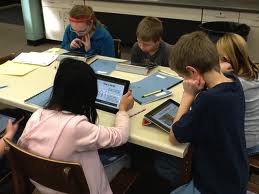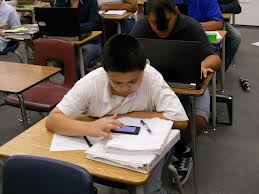Reflect on the idea that tests are the only objective assessments of student learning.
When I began my teaching career 40 years ago, tests were at that time the only assessment given.
So what about today? What does objective mean? And what are objective assessments? I felt I needed to reflect on these questions before I could reflected on the topic above.
Meaning of Objective:
Not influenced by personal feelings or opinions in considering and representing facts.
Objective Assessments:
Objective assessment is defined as a form of questioning with one single correct answer.
Types of Objective Assessments:
-true/false test
-multiple choice test
-matching question test
-short answer tests
Reflection on these types objective assessments:
True/false tests are very easy for students to guess on which may lead a teacher to think a students knows the materials when they in fact may not.
Multiple choice tests still are easy for students to guess on. However, if a student does guess, the likelihood that they get the correct answer is far less. With students given choices, the teacher can use the incorrect answers to ask students further questions about why they chose that answer.
Matching test is when students must match the information in one column with the information in the second column. This basically lets the teacher know if the student knows basic information and help the student learn the rest of the information.
Short answer tests, also known as fill-in-the-blank, is when students give one word or short phrase to answer the question or to complete the sentence. Again, this type of test is more factual but it guessing won't necessarily get you a correct answer.
So what about today? What does objective mean? And what are objective assessments? I felt I needed to reflect on these questions before I could reflected on the topic above.
Meaning of Objective:
Not influenced by personal feelings or opinions in considering and representing facts.
Objective Assessments:
Objective assessment is defined as a form of questioning with one single correct answer.
Types of Objective Assessments:
-true/false test
-multiple choice test
-matching question test
-short answer tests
Reflection on these types objective assessments:
True/false tests are very easy for students to guess on which may lead a teacher to think a students knows the materials when they in fact may not.
Multiple choice tests still are easy for students to guess on. However, if a student does guess, the likelihood that they get the correct answer is far less. With students given choices, the teacher can use the incorrect answers to ask students further questions about why they chose that answer.
Matching test is when students must match the information in one column with the information in the second column. This basically lets the teacher know if the student knows basic information and help the student learn the rest of the information.
Short answer tests, also known as fill-in-the-blank, is when students give one word or short phrase to answer the question or to complete the sentence. Again, this type of test is more factual but it guessing won't necessarily get you a correct answer.
Students using iPads
Reflection:
After much thought about objective assessments and student learning, I have come to the conclusion that although tests may be objective assessments, they don't totally assess student learning. What they assess is whether or not students can remember information and retrieve it for a test. If that is all you want to know about student learning, then you might get a fairly accurate assessment. Of course, you might have a student that guesses very well like I did when I first began teaching. This 4th grade boy read on a beginning 2nd grade level and was equally low in math. However, he scored on a 5th - 6th grade level in both on the standardized test. I watched him take the test. He didn't read it, he guessed on every question. He finished the test within 10 minutes. The test was not a true assessment of this student's learning. But it lead the parents and others to believe he was at the top of his class academically which was far from the truth. This boy was lacking many skills to be able to perform on grade level.
With all the knowledge we have about assessments and student learning, we would be doing our students a great injustice if we didn't use a variety of assessments, both formative and summative. If we look at the data that we collect from all of those assessments, we are able to see a more complete picture of student learning.
There are many things to think about when looking at student learning like their learning style, multiple intelligences and any situation that may effect the outcome of the different assessments such as learning issues, language issues, medical issues and general life issues. All of these can definitely affect the way a student performs on an assessment. That's why using a variety of assessments for students to demonstrate their deep understanding and higher-order thinking skills,
Student using iPod
Comprehensive Assessment
This video shows how students can demonstrate their learning using other types of assessments.
http://www.youtube.com/watch?v=b9OBhKzh1BM



